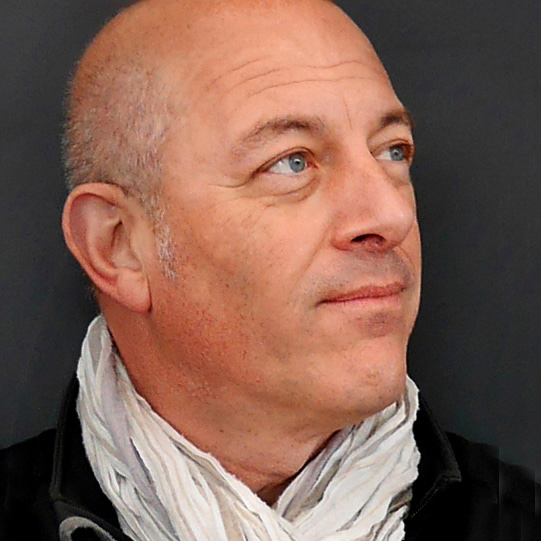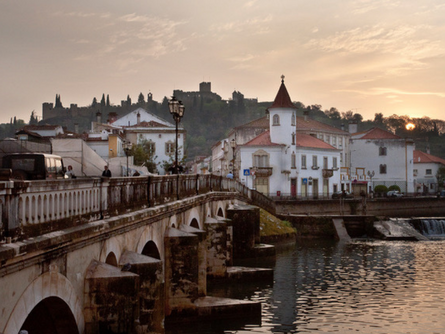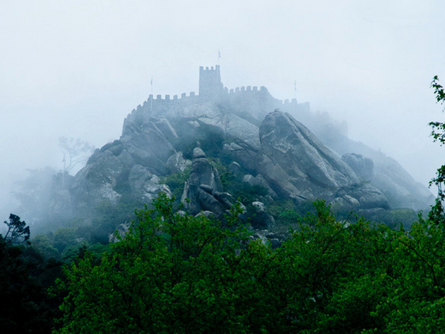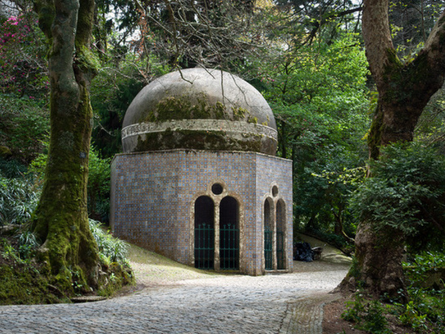
Freddy Silva is one of the world's leading researchers of ancient civilizations, sacred sites and their interaction with consciousness. He is the best-selling author of The Divine Blueprint.
MOREJoin best-selling author & ancient mysteries researcher Freddy Silva on this carefully crafted tour of Portugal’s Templar and megalithic sacred sites.
Humanitarians and light workers have been calling Portugal home since 8000 BC, as they sought to experience a personal mystical revelation independent of a narrow spiritual dogma. It first attracted the People of the Serpent, magician priests who survived the sinking of their land in the mid-Atlantic. Then came the Lusitanians, ‘those who hold the light’. Hardly surprising that the Knights Templar followed suit by establishing Portugal as Europe’s first independent nation-state. Far from the reach of Rome they created a utopia whose aura survives to this day. This adventure explores their handiwork along with some of the oldest megalithic structures in Europe. Warning: there may be over-indulgence of pastries, wine and strong coffee in small cups. THIS JOURNEY IS SOLD-OUT READ MORE

Freddy Silva is one of the world's leading researchers of ancient civilizations, sacred sites and their interaction with consciousness. He is the best-selling author of The Divine Blueprint.
MORE




Tour Description
THIS JOURNEY IS SOLD-OUT
Obsession, when channelled to serve the highest human ideals, is a good thing. The Knights Templar and their sister organization the Cistercian Order certainly believed so, and in the 12th century, when the Pope was himself a Cistercian monk, the Templars were allowed to create the first independent nation-state, followed by their own kingdom within a kingdom, a land they raised from the dead, where they established a welfare system for the elderly, schools and hospitals for the poor, and protected people from the Church. Within two generations they created a utopia. No wonder they were loved.

In this adventure we'll be walking in the footsteps of the Templars and discover why this corner of Europe was of profound importance. The most treasured Templar buildings still stand in the town of Tomar, named after a daughter of Mary Magdalene and the Egyptian symbol of spiritual resurrection. We shall explore these, along with the first Gothic cathedral and the only one standing designed according to the original recipe: a place where the soul is sought and the ego is denied.

We shall spend time among the stone village of Monsanto — the sacred mountain —and hike to the summit to see ritual graves used during initiation, as well as an unusual feature the Templars protected by encircling it within a castle — as if the views of Spain and half of Portugal aren’t good enough. We’ll then travel to the megalithic center of the country, a place of deep antiquity, rural towns with narrow cobbled streets and some of the oldest standing stones, dolmens and cromlechs in Europe, the product of an earlier culture with their own obsession of the sacred and the ways of natural energy.

The third part takes to Sintra, the mountain of the Moon, home to the People of the Serpent after the great flood sank their original homeland in the middle of the Atlantic. Described as ta Glorious Eden, it is a place of poets and romantics for its lush vegetation, curative waters and, well… magic. Byron himself came here on vacation only to overstay by three years. You get the picture. We’ll walk a garden of Symbols and Mysteries, once part of the Forest of Angels, descend an initiation shaft and walk a myriad of tunnels just like countless seekers once did; one tunnel continues for five miles before opening under a retreat for Capuchin monks (we’ll skip the first part) whose cells are lined with cork; a hike to the summit reveals a cave used by a monk who lived in solitude for 30 years to discover god.

There’s also a forest walk to take us to the remains of a passage mound whose collapsed tunnel reappears in another mound three miles away inside a magic garden designed by the artist king and Rosicrucian Grand Master Fernando II.
Clearly such people went to enormous lengths to achieve spiritual transfiguration in Portugal, so the least we can do is follow suit.
Arriving in Lisbon airport, you’ll be met and transferred to the hotel, a 20-minute drive. Spend the rest of the day wandering one of the oldest European cities, a true capital of culture, eating pastries and drinking Bica (espresso) at one of many miradouros overlooking the ancient city.
In the evening, chaperoned by outstanding Beaux Arts architecture, we’ll walk to Alfama, the old Phoenician and Arabic quarter to enjoy our welcome dinner at Clube de Fado and listen to Fado, the traditional Portuguese music influenced by north Africa, when even grown men are reduced to slobbering wrecks by songs about longing, loss and heartbreak. A totally cathartic experience.
(Overnight in Lisbon at Hotel de Alegria or similar)

Check out and depart for Almourol, where a short riverboat crossing takes us to an iconic Templar castle on an island on the river Tejo. Build upon a former temple of Isis, the castle served a defensive purpose but also highlighted the Templars’ dedication to protect ancient sites presided by a feminine deity.
A short drive takes us to Tomar, axis mundi of the Templar order and their most important monuments. The majority of the town’s houses and narrow lanes are original 12th century, arcing around the River Nabão, with its Arabic waterwheel and the restful Parque Mouchão.
After lunch (on own) we’ll hike up the original footpath through the gardens of Sete Montes to Convento de Cristo, where big Templar secrets reside, and spend the rest of the day looking for them. The unique Manueline architecture is worth the experience in itself, together with secluded cloisters, and a secret ritual chamber beneath the central rotunda, known to those ‘on the inside’ as the proper location of the Grail.
A hike back down the old cobblestone track offers a view of Tomar, leading us to pick up our luggage and check-in (the lanes are too narrow for vehicles).
In keeping with the Medieval theme, dinner is at Taverna Antiqua, with its medieval menu (the boar is excellent), and outbursts of jousting; torture of heretics is optional, but do join in if requested by the Inquisition.
(Overnight in Tomar at Hotel Casa dos Oficios or similar)

An early morning drive takes us to the charming town of Alcobaça and its prized monastery, the original Gothic structure and possibly the only one still reflecting the recipe set down by the spiritual head of the Templars, Bernard de Clairvaux. There are no statues of saints or pained scenes of crucifixion, nor stained glass, only the play of light amid geometric proportion and naked limestone. It is a place where god is sought and the ego is denied. Walking the nave alone leads to contemplation of the soul, and that’s the point. The adjacent cloister will test your ability to feel its earth energies, and to help you locate them there are hidden dragons carved on pillars.
A quick lunch in town on own (where there is no avoiding the Queen of Pastries) takes us back to Tomar and a walk to Santa Maria do Olival, the Templars’ Mother Church, an example of Portuguese Gothic architecture and resting place of 22 Templar Masters. Its secret tunnels run under the river, the town, and lead to the hilltop castle.
Finally, we walk to the main plaza with its Masonic pavement, whose focal point is the statue of Gualdino Paes, the Templar Master around whom much of Portugal was created. We wrap up with a visit to the church dedicated to John the Baptist — the Templars’ real figurehead — where we’ll discover a hidden alignment to Temple Mount 2500 miles away, hints to a secret bloodline in Portugal, and a link between Tomar and the Ark of the Covenant.
We'll enjoy dinner together at Bela Vista restaurant in Tomar.
(Overnight in Tomar at Hotel Casa dos Oficios or similar)

After check-out, part two of our adventure takes us on a long but scenic drive to northern Portugal and Monsanto, sacred mountain since the early Neolithic and home to the Lusitanians, the People Who Carry the Light. After lunch at Adega Tipica O Cruzeiro (with its scenic view of the valley) we’ll hike through the village where houses are built with or incorporated into the huge granite boulders; some foundations date back to the stone age. We’ll be met at the summit with church ruins dating to the Visigoths, and ritual graves which once formed part of a cult of living resurrection. The Templar castle surrounding the summit is a superior example of stonemasonry in itself, and encloses a truly mysterious egg-shaped boulder above a ritual shaft where initiates spent days in incubation. If that alone isn’t enough of a draw, the view across Iberia is exceptional.
Check-in to our various B&Bs (Monsanto caters little to tourism) and later enjoy a dinner of simple but hearty local food prepared in a tiny restaurant called Petiscos e Granitos that uses a boulder as a wall; if the weather is warm, half of Portugal can be admired from the terrace. Last time I took a small group here we drank all the red wine. Obviously the manager remembers me (I don’t remember anything).
Should you get the call, feel free to return to the summit at night to meditate under the stars. Bring a torch, and return to the body by breakfast.
(Overnight in Monsanto at GeoHotel Escola or Casa Pires Mateus or similar)

Check out of Monsanto. Stopping at the foot of the mountain, beside the Visigothic chapel of S. Pedro Vira Corça, we’ll see ritual rock-cut graves used in the living resurrection initiation. Should you wish to experiment, we’ll come retrieve you next year.
A casual drive takes us through the agricultural heart of Portugal, lined with old villages, and peppered with enigmatic cork and olive trees beneath a big blue sky. We’ll stop for lunch (on own) in the rural village of Gafete and eat simple, hearty food with the locals, then continue on to Pavia, where the Church attempted to disguise a dolmen made from massive stones; the added bell tower is priceless. It’s a hint of the region’s Neolithic past.
We continue through the rolling landscape of Alentejo — breadbasket of Portugal — and by late afternoon we reach Evora, one of the oldest cities in Europe and epicenter of a large megalithic society.
Check-in and free time to experience dinner outdoors.
(Overnight in Evora at The Noble House or similar)

Old Evora is still encircled within a protective wall (it’s a UNESCO World Heritage landmark). The morning is free to wander the narrow, winding cobblestone lanes, taking in the infectious charm of whitewashed homes, some of which are over 1000 years old. Or waste it away with a devilish selection of Pastéis de Nata and other dessert delicacies waiting to be eaten in pastelerias around Praça do Giraldo. Or go cultural, visit the Franciscan chapel constructed with 5000 skeletons (it actually has an odd charm about it), or the city’s summit garden with its Roman temple of Diana, itself built over an earlier temple from 6000 BC.
After another outdoor lunch (on own) in an old plaza or quiet lane, we go experience the most prominent megaliths in the region: Barrocal dolmen, Zambujeiro passage mound (one of the largest in Europe, with 20-ft tall monoliths), and finally, the standing stone of Almendres and its attendant stone circle and ellipse — the focal point for local sacred sites. The curious collection of curved monoliths makes the entire hillside resemble an egg farm for gods.
Return to Evora for free time and another (yawn) meal under the stars.
(Overnight in Evora at The Noble House or similar)

The third part of the adventure circles back toward Lisbon, to Sintra, Mountain of the Moon, sacred to chthonic cults since the Mesolithic — a “glorious Eden” to quote Byron, who came here on vacation, only to depart three years later. Driving into its bucolic landscape you’ll understand why. The eucalyptus and pine-covered mountain is home to no less than ten national monuments, mini-palaces, crystal caves and lost stone circles.
After an early lunch (on own) near the original town square (whose homes were built by the Templars) we’ll walk to the otherwordly Forest of Angels. Now called Quinta da Regaleira, it is a labyrinthine scenographic garden, whose owner designed it as a means to expose people to the Mysteries teachings during their resurgence in the late 19th century. We’ll walk by statues of gods, enter the underground River of Forgetfulness, learn about the Two Towers and the lineage of Mary Magdalene (the central figure for the Templars), then descend the shaft of initiation and its 17 Ways, wander through tunnels into the belly of the Earth Mother, reach a second shaft (which most never get to see), and finally reappear in the real world. Regaleira is as close to an experience of paradise as you’ll find today.
Heads and hearts full, we walk back to Sintra old town and check-in.
(Overnight in Sintra at Sintra Boutique hotel or similar)

But wait, there’s more. Today we take narrow little mountain lanes in two small vans. First stop is Santuario de Capuchos, where eight Capuchin monks lived the simplest of all existences among a verdant world of eucalyptus, sycamores and moss-covered stone in order to experience god; the only luxury they allowed themselves was window frames lined with cork, but even that much drove one monk to the summit to live as a hermit between two boulders for 30 years, surviving on a diet of locusts, honey and rain water. He lived to see his 100th birthday. We’ll go find his secret to longevity.
After a casual lunch (on own) in Azoias, the westernmost point in Europe, we return to the mountain to hike the woods and locate Anta de Andrenunes, the remains of a massive passage mound, with its open view to the Atlantic and the now sunken home of its builder gods, the People of the Serpent.
We’ll return to Sintra via delicious villages dotting the foot of the mountain, and close the week with a quiet hike through Pena Palace gardens (where the exit to the above passage mound lies, 3 miles away!). Following the spirit of Regaleira, the site was created by the artist king Ferdinand II, who sought to connect the soul with the bigger picture. Among this verdant paradise and curving footpaths you will find hidden chalets, Arabic chapels, moss-covered fountains, secret tunnels, grottoes, and stone steps cut as though made for faeries or wandering giants.
We wrap up a full day by returning to Lisbon and enjoying a farewell supper at Casa do Alentejo.
(Overnight in Lisbon at Hotel de Alegria or similar)

But not so final because you’ll wish to return someday. Alas, today is departure day. To overcome this grief, there’ll be a final opportunity to buy pastries at Lisbon airport (in case you missed the other 47). And if all else fails, there is always a shop selling Fado CDs so you can take some longing home. Adeus.
(B = Breakfast; L = Lunch; D = Dinner)
Note: This itinerary is subject to change due to conditions beyond our control.
